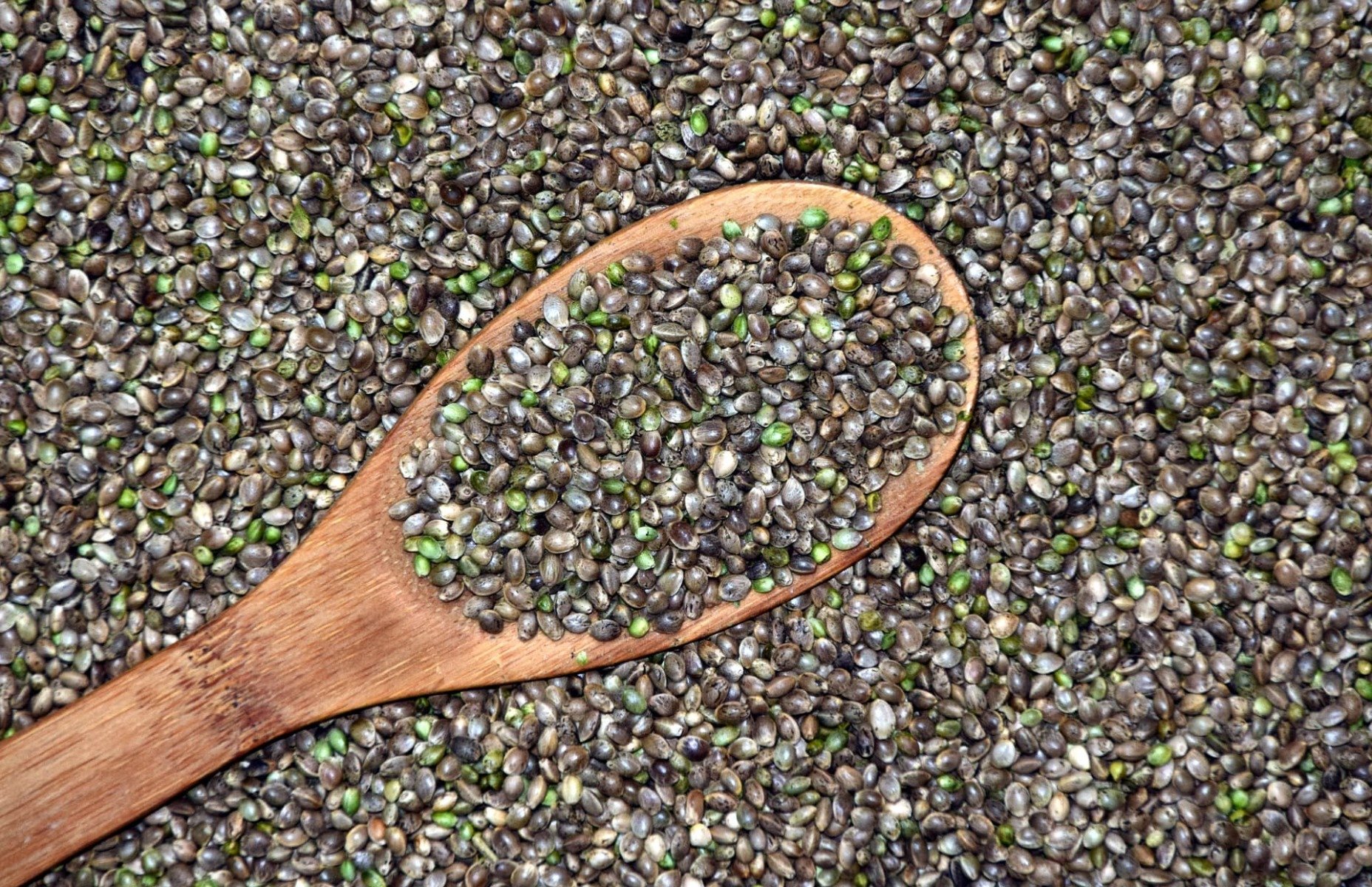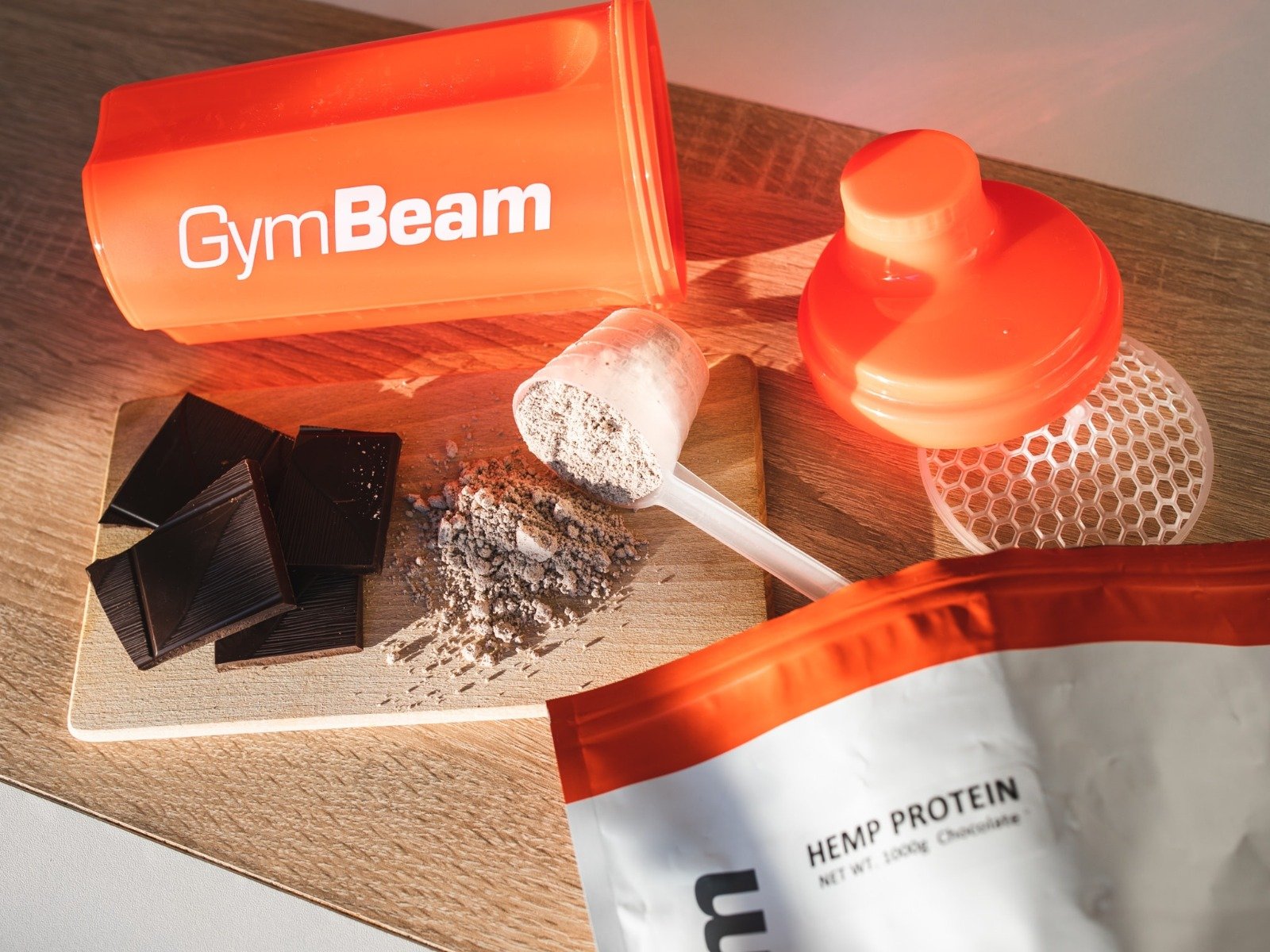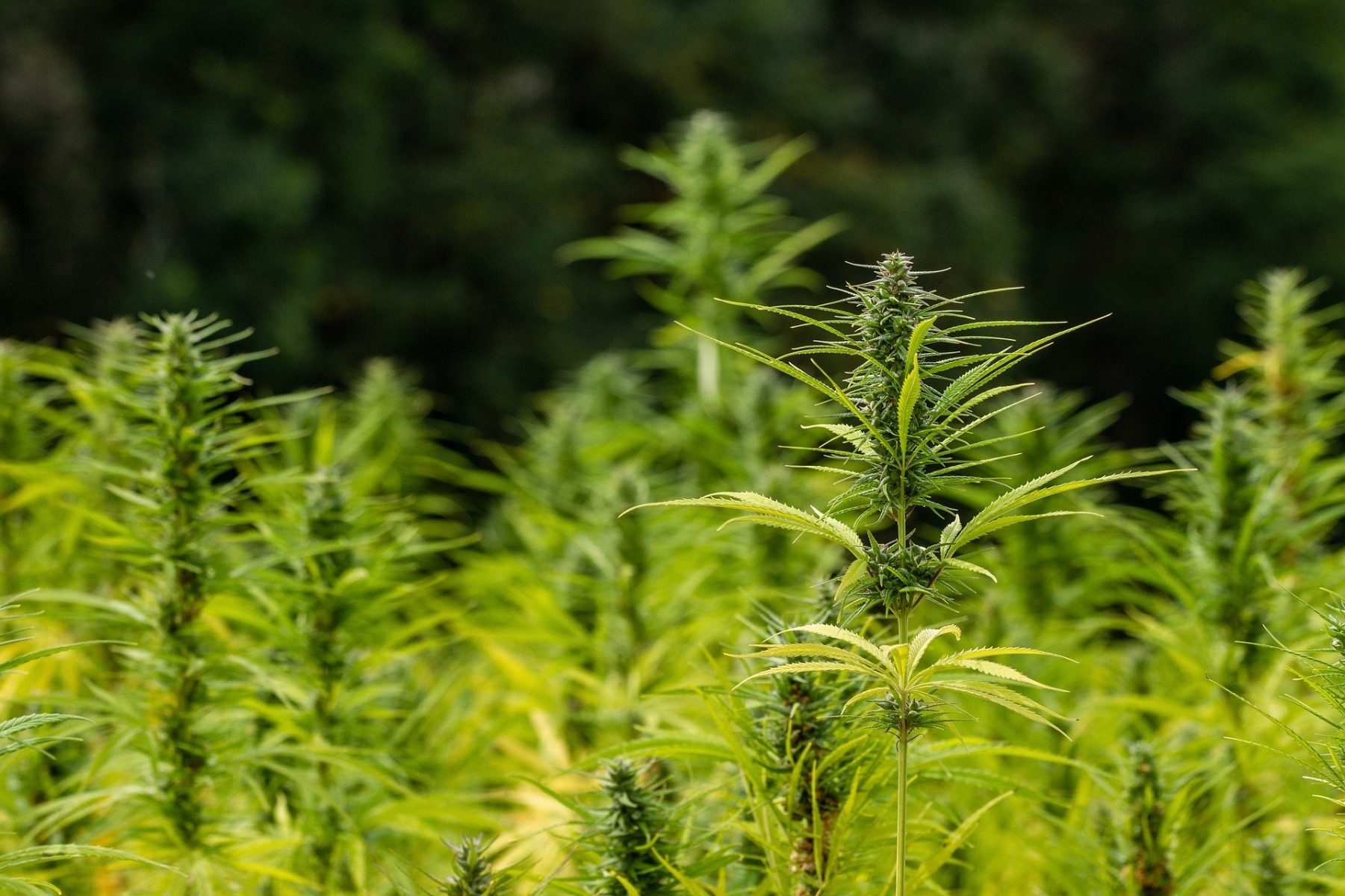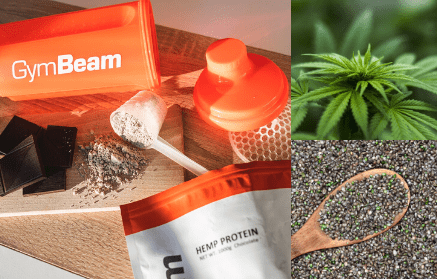Table of Contents
Are you looking for a way to consume less meat and find quality forms of vegetable protein? Cannabis protein is a less-known source of a protein whose supplementation has several advantages. In addition to being well digestible, it also contains a significant amount of fibre, minerals or omega-3 and omega-6 fatty acids. Get to know the reasons why to consider this plant-based protein alternative.
A source of hemp protein
Cannabis protein is produced from seeds of a plant Cannabis Sativa. Protein is a by-product of oil production, where the seeds are reprocessed after oil extraction to produce protein. The seeds themselves have a relatively wide application, and are used for direct consumption, but also produce milk, oil, cheese substitutes or hemp protein. Small seeds are characterised by high fibre, protein and fatty acid content, including omega-3 and omega-6 fatty acids. [1] [2] [3]

For a better idea of the nutritiousness of cannabis seeds, we present the content of essential nutrients in 20 grams (2 tablespoons) [1]:
- proteins – 6,31 g
- fats – 9,75 g
- carbohydrates – 1,73 g (0,8 g presenting fibre)
- phosphorus- 330 mg
- potassium – 240 mg
- magnesium – 140 mg
- calcium – 14 mg
- iron – 1,59 mg
- folic acid – 22 μg
Apart from the above ingredients, cannabis seeds also contain vitamins A, C, E and some of the vitamins of Group B. [1]
Cannabis Sativa is not marijuana
When you say “cannabis”, many do not seem to think of an industrial plant used by our ancestors, but a very well known drug. Cannabis sativa and cannabis indica are different strains of the same plant. Although both are used for medical purposes, they differ in their composition. Cannabis plants contain so-called cannabinoids, and the best-known is the so-called tetrahydrocannabinol (THC), which is responsible for specific states of euphoria. While Indian hemp is grown for its high THC content, hemp contains only trace amounts of this cannabinoid. Therefore, you do not have to worry about experiencing psychoactive effects after taking cannabis products. [1] [4]

You might be interested in these products:
Benefits of hemp protein
Full-fledged source of protein
Proteins containing all essential amino acids are considered to be a full-fledged source of protein. Plant sources are generally considered to be inferior, but hemp protein is an exception. You will find all 9 essential amino acids found in other full-fledged protein sources, such as meat or dairy products. When it comes to exact values of the amino acids, the results of the research are not unequivocal. A 2004 study found that hemp protein can be classified as a high-quality protein source similar to soy or egg whites. According to other researches in 2006 and 2010, the hemp protein contains only a small amount of the amino acid lysine, which reduces the overall quality of the protein. Apart from the essential amino acids, the protein also contains arginine, which is one of the partially essential amino acids and is very beneficial for the organism. [3] [5] [6] [7] [8]
For a better comparison, here is a table showing the amino acid content of hemp, whey, milk and eggs [9]:
* – the essential amino acid tryptophan is missing in the table because it was not part of the measurement.
Are you interested in which sources of protein are classified as high-quality proteins? Read all the important information in the article: High-quality protein – how to find out which source of protein is of the highest quality?

Source of fibre
One of the advantages of hemp protein is its fibre content. Other plant-based protein sources, such as rice, soybeans or peas, are characterised by a low amount of fibre. In 30 grams of hemp protein, there is up to 7-8 g of fibre, which represents approximately 18-28% of the recommended daily intake. Its content differs depending on whether it is made from peeled or unpeeled hemp seeds. Fibre is a vital component of the diet, even though it is difficult for the digestive system to digest it. It prevents heart disease, improves the condition of the digestive system and is also crucial in the regulation of body weight. The consumption of hemp protein is a double prize due to fibre because you supplement it with the necessary protein and fibre at the same time. [5] [10]
Low content of antinutrients
Antinutrients are part of many crops because they are a natural protection against bacterial infections or birds and insects. The presence of antinutrients can be found in cereals, nuts or legumes. For humans, antinutrients are a problematic component because they make food difficult to digest while preventing the absorption of minerals and vitamins. Antinutrients include, for example, phytic acid and tannins which can be found in pea or soy protein. Phytic acid blocks the absorption of iron, calcium, zinc and magnesium, and tannins reduce iron absorption. Hemp protein is characterised by a low amount of these antinutrients, making it a better source of minerals. [11]

Unsaturated fats, minerals and antioxidants
Hemp protein is produced from seeds that have been pressed to obtain hemp oil. Even after pressing, the seeds still have about 10% of the original fat content. 80% of the fat content of hemp protein is polyunsaturated fats, and at a dose of 30 g of protein, you receive about 3 g of fat. They contain omega-3 and omega-6 fatty acids, such as alpha-linolenic acid (ALA) and gamma-linolenic acid (GLA). Omega-6 and omega-3 are present in the hemp protein at a ratio of 3: 1, which is very beneficial to health, the so-called “Western” way of eating is an unbalanced 15: 1 ratio. This ratio is associated with several chronic diseases, but by balancing this ratio, you also improve your general health. Apart from reducing the risk of heart attack and heart disease, omega-3s are beneficial in maintaining a healthy brain, eyes, and development of the nervous system. [5] [11]
Are you interested in omega fatty acids and want to know more about them? You can find all the necessary information in the article: Omega-3 fatty acids: do you consume them enough and in the right proportion to omega-6?
Hemp seeds are a great source of several minerals such as magnesium, iron, zinc or phosphorus. There is known research which in a relevant way investigated the balance of minerals after pressing seeds for oil production. However, the composition of several cannabis proteins suggests that 1 dose of protein contains 80% of the recommended daily intake of magnesium and 52% of iron. Hemp seeds also include lignin amides, which are important for their antioxidant attributes. [5]
Suitable for vegans and vegetarians
There are several sources of plant protein, but due to its amino acid profile, hemp protein is among the most interesting. Whether you are a vegan, a vegetarian or just trying to reduce your meat intake, hemp protein is a great choice. Hemp is also interesting from an ecological point of view, as it grows fast and it is space-saving. [12]
Easily digestible
The popularity of animal protein sources is also due to its relatively easy digestibility compared to other plant protein. Based on research, proteins in hemp are digestible up to 91 – 98%. According to scientists, this causes the occurrence of albumin and edestin proteins, which the human body can easily break down. The combination of all amino acid content and easy digestibility makes cannabis protein an interesting choice comparable to animal proteins. [5]

Risks of using hemp protein
Hemp seed allergy
Hemp is not a traditional and common allergen, but that does not mean that there are no people for whom hemp seed consumption is dangerous. An allergy may manifest with common symptoms such as breathing difficulties, eczema, pruritus or abdominal pain. Anaphylaxis may also be a rare but potential risk of allergy to hemp. It is a life-threatening immune response to a substance, manifesting itself as a narrowing of the airways, a contracted throat, a rapid pulse or loss of consciousness. [13]
Increased doses of minerals
Hemp protein is rich in minerals, especially iron and copper, which may pose a certain risk if the intake of these proteins increases. Also, one dose of hemp protein presents almost 100% of the daily recommended copper intake. Copper toxicity is rare according to the National Institue of Health (NIH), but frequently increased copper intake can cause liver damage, abdominal pain or nausea. When it comes to iron, a single dose of hemp protein of 7.5 mg per day poses no risk. The problem may occur when the maximum daily iron intake presenting 45 mg is exceeded, which would mean taking 6 doses of hemp protein. [13]

Dosage of hemp protein
On the packaging of specific products, you will surely find the recommended dosage or the included measuring cup. In general, daily protein intake varies depending on your fitness goal. If you have a sedentary job and you are not interested in changing body composition, it is advisable to consume 0.8 g of protein per kg of your body weight. Active people and athletes, or people with an ambition to reduce fat and maintain a slim figure, should consume 1-1.5 g per kg of their body weight. If you are interested in maintaining muscle mass and reducing fat, it is advised to take 1.5-2.2 g of protein per kg of your body weight. [2]
Hemp protein is an excellent source of protein and a suitable plant-based alternative. The amino acid attributes, absorbability as well as mineral and vitamin content, are the reasons why hemp protein is one of the best options among plant protein sources. Whether you are a fan of whey or other protein sources, we believe that we have broadened your horizons and got to know everything necessary about hemp protein. Do you want your friends also to get to know about hemp protein and its benefits? Feel free to support the article by sharing it with them.
[1] Megan Ware - What are the health benefits of hemp? – https://www.medicalnewstoday.com/articles/308044
[2] Kamal Patel - Hemp Protein – https://examine.com/supplements/hemp-protein/
[3] Cathleen Crichton-Stuart - Health benefits of hemp seeds – https://www.medicalnewstoday.com/articles/323037
[4] Kimberly Holland - Sativa vs. Indica: What to Expect Across Cannabis Types and Strains – https://www.healthline.com/health/sativa-vs-indica
[5] Erica Julson - Hemp Protein Powder: The Best Plant-Based Protein? – https://www.healthline.com/nutrition/hemp-protein-powder
[6] Callaway, J.C. - Hempseed as a nutritional resource: an overview – https://pubag.nal.usda.gov/catalog/1498316
[7] House J.D., Neufeld J, Leson G. - Evaluating the quality of protein from hemp seed (Cannabis sativa L.) products through the use of the protein digestibility-corrected amino acid score method. – https://www.ncbi.nlm.nih.gov/pubmed/20977230
[8] Tang CH, Ten Z, Wang XS, Yang XQ - Physicochemical and functional properties of hemp (Cannabis sativa L.) protein isolate. – https://www.ncbi.nlm.nih.gov/pubmed/17090145
[9] Stefan H. M. Gorissen, Julie J. R. Crombag, Joan M. G. Senden, W. A. Huub Waterval, Jörgen Bierau, Lex B. Verdijk, and Luc J. C. van Loon - Protein content and amino acid composition of commercially available plant-based protein isolates – https://www.ncbi.nlm.nih.gov/pmc/articles/PMC6245118/
[10] Tim Newman - Why do we need dietary fiber? – https://www.medicalnewstoday.com/articles/146935
[11] Lindsay Boyers - Benefits of Hemp Protein – https://www.livestrong.com/article/88254-benefits-hemp-protein/
[12] HEMP PROTEIN: ALL YOU NEED TO KNOW – https://purekana.com/blogs/news/hemp-protein-all-you-need-to-know/
[13] Jody Braverman - Side Effects of Hemp Protein – https://www.livestrong.com/article/464473-side-effects-of-hemp-protein/


Add a comment